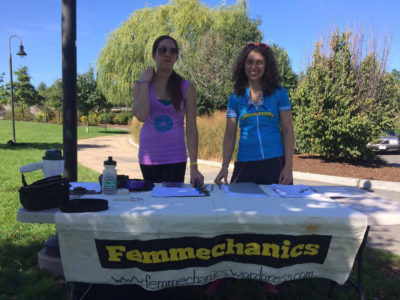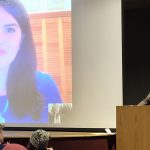
Creating a safe space for minority gender populations is as easy as riding a bike — literally.
Cycling group Femmechanics gathers femme, transgender, women and non-binary bikers across Boston to foster a supportive community and redefine the way society views cyclists.
According to avid cyclist and Femmechanics member Stacey Lantz, the group was started just three years ago out of a passion for cycling, but also for inclusivity and equality.
“Cycling lets you connect to a lot of different things,” Lantz said. “You can connect to the community, you can connect to different organizations, you can connect to yourself, your body, the environment, and that can hold a lot of power as well.”
After noticing an underrepresentation of minority gender populations in the biking community, the group came together with the mission of creating a safe space for those who do not identify with traditional gender and sexuality definitions, Lantz said.
Femmechanics advocates for the idea that knowledge of these skills generates an overall confidence that can be applied to not just cycling, but other areas of life as well. This sense of confidence and security is key in creating a safe space for minorities, Lantz said.
“In my experience, organized sports are most accessible to gender minorities when athletes’ gender identities are respected,” said Evan Leto, a junior in Boston University’s College of Arts and Sciences.
Leto further described how playing sports with primarily other genders and sexes majority can create anxieties for trans athletes because they become self conscious and uncomfortable.
In light of this, Femmechanics encourages inclusivity of any interested cyclists within the LGBTQ+ community, Lantz said. They gathered cyclists who aligned with their mission at Cambridge’s Broadway Bike School for what is known as “Grrrease Time.”
This recurring workshop focuses on teaching cyclists basic bike mechanics. It gives them hands-on learning experience to fix their own brakes, pump their own tires and clean their own bikes.
According to Lantz, Femmechanics demonstrates a horizontally-run group, meaning there are several members in charge. Members are urged to express their opinions, take advantage of new opportunities and bike at their own pace.
Lantz stated that the opportunities the group provides is its greatest asset. She described an event called Bike Camping, where members bike with backpacks and equipment to campgrounds located several miles away. They participate in a camping experience while practicing long distance bike rides and learning how to transport materials.
Femmechanics hosted their third annual event, Babes Bike Boston Saturday. The event is a biking scavenger hunt known as an alleycat race which is aimed at bringing together the group through strategy and teamwork around Boston, Lantz said.
She noted that it is one of the most highly attended alleycat races in Boston, aimed at inspiring unity and collaboration for the Femmechanics community.
“[Femmechanics] really came out of people recognizing this space didn’t exist and wanting to create it,” Lantz said.
She explained that it has the unique benefit of making the cycling world smaller for femme, trans, women and non-binary cyclists. They are able to recognize each other out on the bike path or across the street because they have been brought together by a desire to change the standards of cycling.
The group draws upon the big picture aspects of cycling to enhance their mission and to generate a newfound confidence for cyclists in a world where they are underrepresented.
However, Femmechanics has received negative backlash for their mission.
Some cyclists have expressed a dissatisfaction with the name of the group, Lantz said. In its mission to target femme, transgender, women and non-binary cyclists, some cyclists said the group blatantly excludes cis men, which is hypocritical toward the mission statement.
But the group is willing to sacrifice the preferences of majority populations who already have a large presence in the cycling world in order to create a safe space for those who do not, Lantz said.
Regardless of critics, Femmechanics’ online manifesto stresses “[taking] the wrenches into our own hands,” so this ever-growing community attempts to lead the cycling revolution by doing just that.




